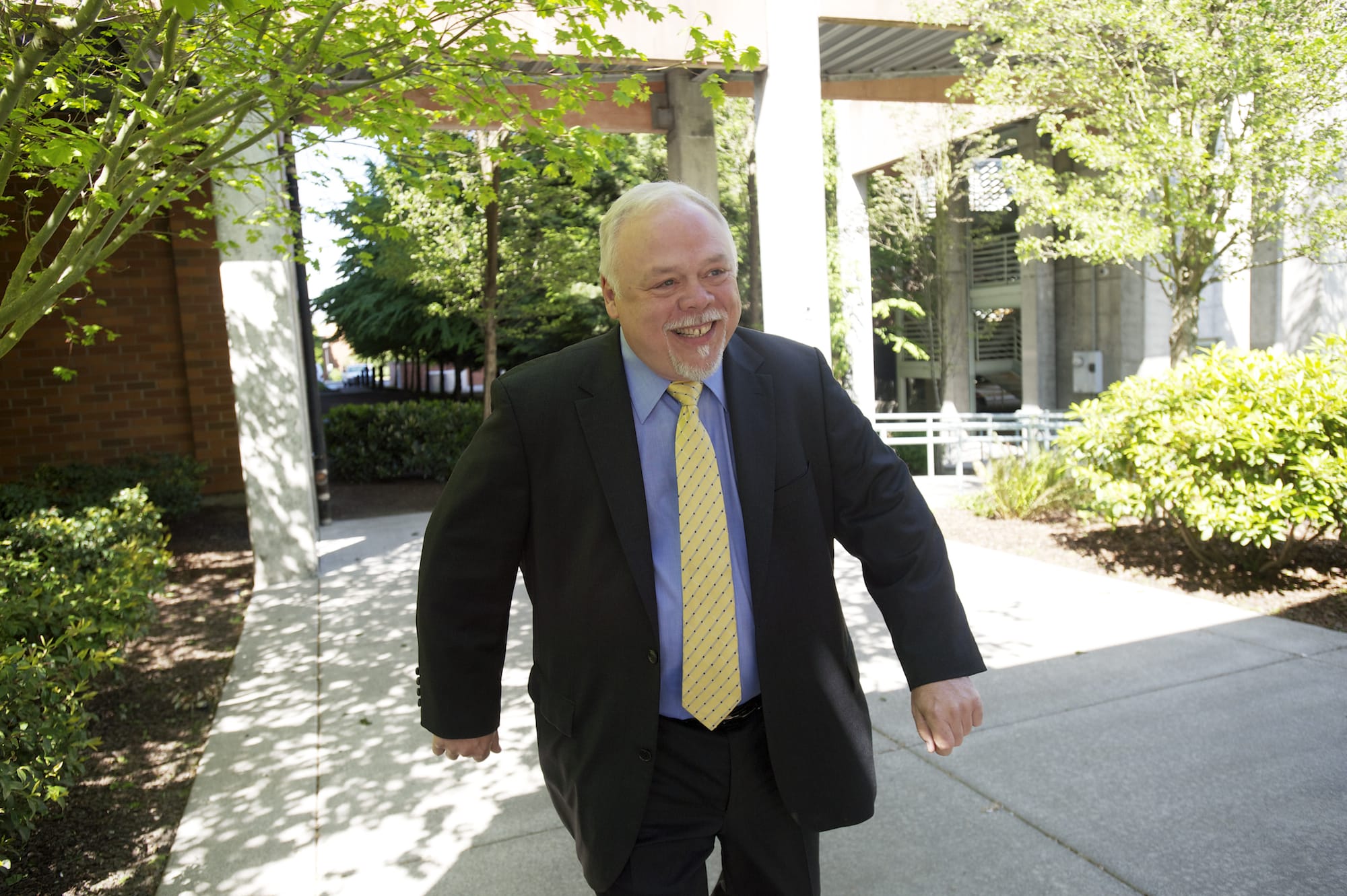A Clark County commissioner expressed interest in charging polluters, specifically newspapers, a special fee months before the Department of Environmental Services proposed the idea at a March 19 work session.
Emails obtained by The Columbian through a public disclosure request show that a proposal to assess an “environmental surcharge” on newspapers did not receive high marks from department managers but was nonetheless presented at a county commissioners work session, where it was considered a top option.
The newspaper surcharge, one of several fee proposals highlighted at the March meeting, followed a series of articles about commissioners David Madore and Tom Mielke, along with their involvement in hiring Don Benton, a Republican state senator, as head of the Department of Environmental Services.
Benton has said, however, that there is no vendetta against the paper.
The March meeting was used to help the Department of Environmental Services present scenarios to generate more revenue for the county’s water program, which has exhausted its fund balance and faces a $1.6 million shortfall.
Two funding issues were addressed at the March meeting. For one, the county is on the hook to pay a $3.6 million lawsuit for violating the Clean Water Act. Meanwhile, new stormwater permitting requirements are driving up expenses within the program.
A surcharge on newspapers, also referred to as a litter fee, was proposed as part of a long-term solution to filling the program’s budget shortfall. It was presented along with a number of other fee-generating options, directed at “polluters.”
The newspaper surcharge proposes assessing up to $150,000 on daily newspapers produced and distributed in Clark County, but only those with a circulation of more than 28,500. Only The Columbian meets those parameters, although Benton didn’t rule out extending the fee to other papers. That decision would be left to the commissioners, however.
While Benton said the idea for a litter fee came up in a “brainstorming” session with managers, the idea was presented in an email predating those sessions.
‘A commissioner’
In a Jan. 29 message to Division Manager Ron Wierenga and Program Coordinator Chris Clifford, Benton wrote that “a commissioner” was interested in charging polluters directly. Gas stations and newspapers were identified as two potential businesses. In the email, Benton discounted gas stations as a viable idea because they already pay fees for toxics cleanup.
Benton declined to say which commissioner made the suggestion. The newspaper surcharge was later added to a list of 14 ideas borne out of a Feb. 11 brainstorming session of environmental services managers.
The idea ended up scoring toward the bottom of the department’s list of revenue-generating scenarios, which took into account how the public would perceive the fee and the ease of collecting it.
Some department managers also expressed concerns about the surcharge. In a March 12 email to fellow managers, Wierenga wrote that assessing an annual fee to newspaper sales would mean they’d “either go out of business or go to online-only, (and) then you’re short revenue in a hurry.”
Two days later, Wierenga advised Benton to scuttle the idea altogether.
“I’m concerned about the newspaper fee,” he wrote in an email sent less than a week before the work session. “I think it’s a red herring, will draw unnecessary attention, and proposing it without further analysis is a risk that offers little gain.”
In an interview, Benton said the proposed newspaper fee had been misrepresented, and he reiterated that it was just one of many ideas for boosting the water program’s waning budget, which had been operating at a deficit for years.
He said Wierenga’s concerns about the surcharge were taken into consideration, but he made the final decision to present the idea to commissioners. “I receive a lot of recommendations from staff I don’t follow,” Benton said.
“I run an open shop. ‘Yes men’ don’t make me better at what I do,” Benton added.
County commissioners will ultimately make a decision about which fees to pursue. Both current commissioners have complained about The Columbian’s coverage in the past.
Mielke and Madore, the two commissioners remaining on the board following Steve Stuart’s departure earlier in the month, have butted heads with the paper, working to both limit the county’s advertising in it as well as its availability in county buildings. Mielke said the newspaper was bad for morale.
Benton has done the same. In a July email, he directed his management team to publish all public notices and advertisements in The Reflector, a community weekly newspaper that serves the northern portion of the county. He cited the cheaper advertising rates as the reason for the move.
In March, Mielke and Madore scrapped a long-standing advertising contract with the paper, meaning the county’s legal notices will now appear primarily in The Reflector.
That decision came against the wishes of the county’s Purchasing Manager Mike Westerman, who said the decision could conceivably cost the county more money in the future. Again, commissioners cited the lower cost of doing business with a weekly paper as their rationale.
Benton said he planned to look at different ways of rebuilding the clean water program budget, including possibly retooling an environmental surcharge levied on fast food businesses. The newspaper surcharge will remain on the list.
That’s because the production of newspapers relies on using wood pulp and inks that pose environmental dangers to water supplies, Benton said. He said Scott Campbell, the publisher of The Columbian, is one of the biggest polluters in the county.
Campbell has said the newspaper would fight any fee it felt was retaliatory.



